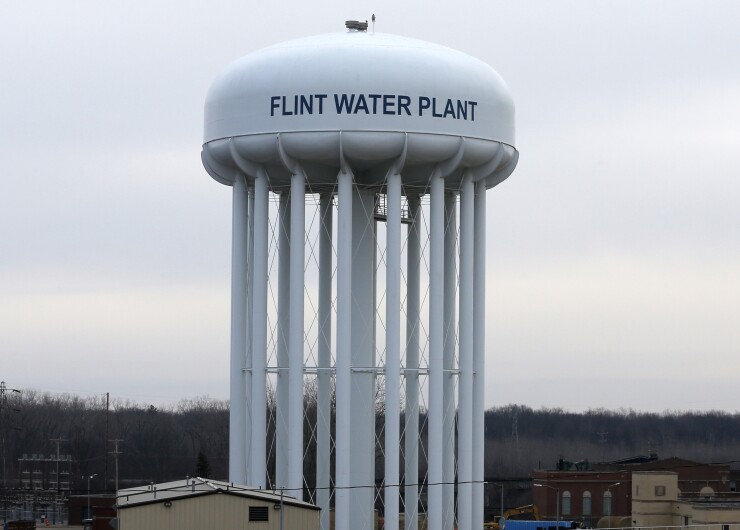Michigan’s $600 million proposed settlement of litigation over the 2014 Flint water contamination crisis aids the state’s credit by providing certainty over its fiscal exposure, Fitch Ratings says in a special commentary.
The settlement
Fitch rates Michigan AA with a stable outlook.

Michigan Gov. Gretchen Whitmer and Attorney General Dana Nessel — both of whom inherited the crisis from their predecessors — in August
If the settlement meets court requirements, state officials expect the U.S. District Court for the Eastern District of Michigan to preliminarily approve it by mid-February. Final approval would still be needed and local courts will also have a say in actions related to the settlement.
The Michigan Strategic Fund will issue bonds as soon as the first quarter of 2021 to make an upfront $600 million payment to a special purpose entity that would manage claim payments. The bonds likely will carry annual appropriation support from the state with annual payments going to cover debt service. State legislative approval would be needed.
“Most importantly, from a credit perspective, the proposed settlement addresses our prior concern that escalating legal liabilities would constrain operating performance and hamper longer-term strategic planning,” Fitch said. “Financing a lump-sum settlement payment with new debt will leave Michigan's $850 million rainy day fund untouched and cash at high levels. Michigan remains well-positioned to weather the uncertainties surrounding the coronavirus pandemic and its implications for state revenues.”
The updated preliminary pact totals $641.2 million with the city of Flint contributing $20 million, McLaren Regional Medical Center will pay $20 million, and Rowe Professional Services Co. will provide $1.2 million.
The crisis occurred after the city's contract with Detroit to receive Lake Huron water ended and the city shifted to Flint River water in April 2014 while awaiting the completion of a bond-financed $285 million pipeline carrying Lake Huron water to Flint and other Genesee County communities.
The city, which was under a state-appointed emergency manager, failed to properly treat the Flint River water, triggering lead contamination because of pipe corrosion, and it was not resolved until after the city in the fall of 2015 shifted back to Detroit-supplied water.
The agreement directs 80% of net settlement funds to claims of children who were minors when first exposed to Flint River water. It earmarks 2% for special education services in Genesee County. About 18% goes to claims filed by adults and for property damage. Businesses can also file for losses.
In addition to the toxic lead poisoning of household water that is especially damaging to children’s developing brains, a 2014-15 Legionnaires’ disease outbreak in the Flint region led to the deaths of at least 12 and sickened another 79 individuals.
Fifteen government officials were criminally charged. Seven struck plea agreements. Nessel dismissed all pending criminal cases related to the crisis, two of which were against former state-appointed city emergency managers, and launched her own investigation.





